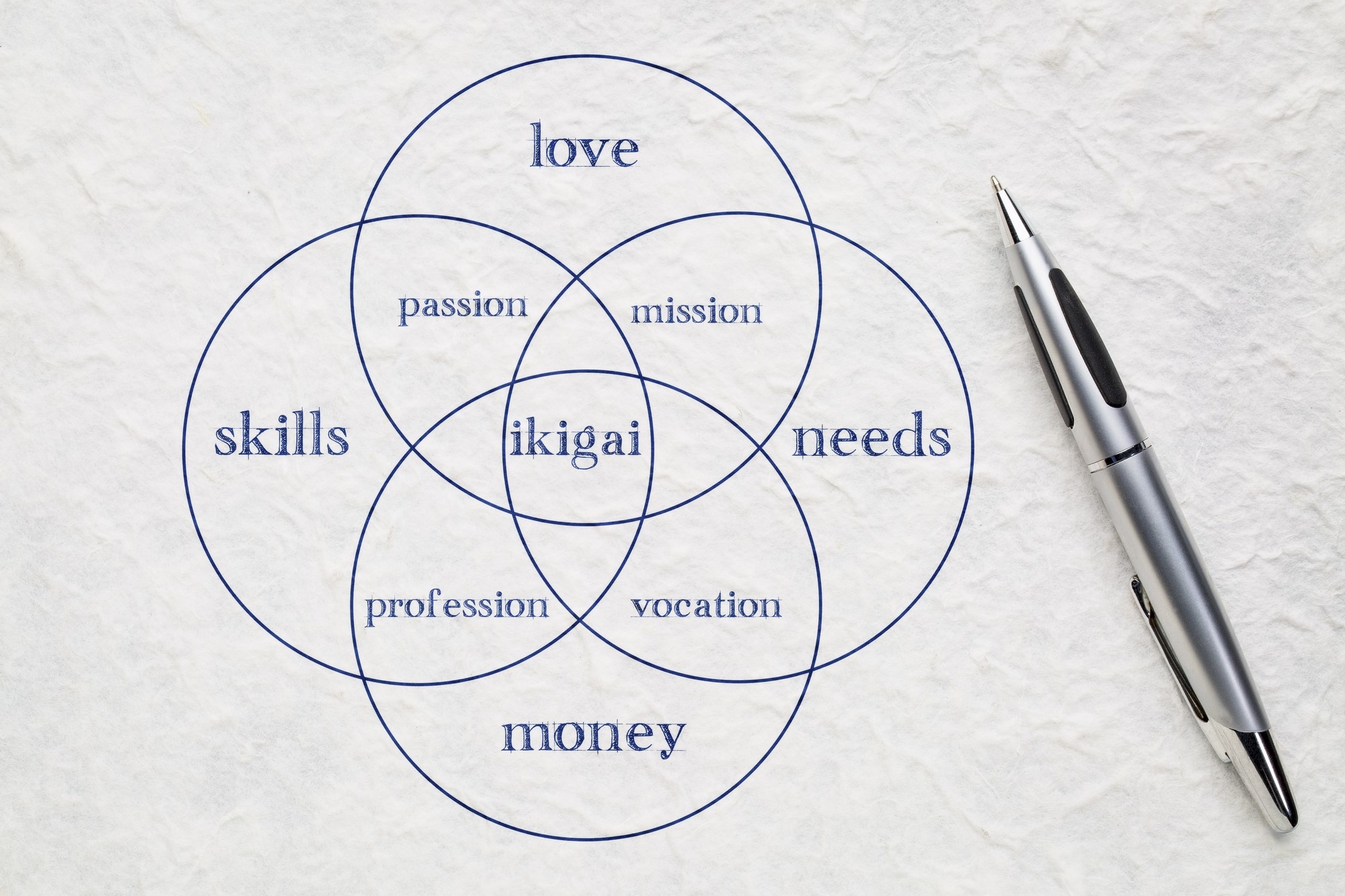Find your ikigai

Prologue
This isn't a guide to finding your ikigai - the Japanese concept of life purpose that lies at the intersection of what you love, what you're good at, what the world needs, and what you can be paid for. Unlike common misconceptions, ikigai isn't about finding the perfect job or achieving work-life balance – it's about discovering your reason for being. You're more than capable of that journey yourself. Instead, consider this an intimate look into my mind – an internal monologue about my quest for meaning. As someone relentlessly pursuing a fulfilling life, I want to share my perspective and the steps I'm taking to achieve it.
My search began over fifteen years ago, when I first questioned the conventional path laid before me.
Introduction
For over 15 years, three questions have consumed my thoughts:
- What is my purpose on this earth?
- Why was I given the chance to exist?
- What unique contribution can only I, Anfal, make to this world?
The conventional life path – birth, education, career, house, marriage, children, death – has never sat right with me. My mind refuses to accept this as the complete story. There must be more. There has to be a deeper reason for my existence.
Consider the astronomical odds that led to this moment. The extraordinary sequence of events that had to align perfectly to create who I am today. Every hardship, every financial struggle, every triumph – change any single element, and I wouldn't be writing these words.
I've had close calls with death, faced illnesses, and stood at crossroads where my life could have taken drastically different turns. Yet here I am, existing in this precise moment in time and space – an outcome so improbable it can never be replicated. This realization comes with a profound responsibility: to honor this miraculous opportunity by discovering my true purpose.
A few weeks ago in Islamabad, Pakistan, I visited my alma mater with a university friend. We discovered a treasure trove – Saeed Book Bank. Like a child in a toy store, I explored the aisles, simultaneously thrilled by the wealth of knowledge before me and wistful that I couldn't absorb it all at once.
There, I found my next read: "Ikigai: The Japanese Secret to a Long and Happy Life." It felt like destiny – I've always been drawn to Japanese culture, their values of minimalism, zen, and simplistic approach to life. I spent the next week immersed in its pages, determined to understand rather than merely read.
Now, as 2025 unfolds, I'm not just reflecting on this book – I'm transforming its wisdom into actionable insights, filtered through my own experiences and perspective.
Disclaimer
Unlike the book's focus on longevity and centenarian insights, my goal is different. I seek a fulfilling, meaningful life. I believe true longevity comes naturally when you live authentically – the universe extends your time to maximize your contribution.
My approach may seem extreme, even reminiscent of new year's resolutions, but I'm committed to following through. I live by three proverbs:
- Work is not work if you're doing what you love
- A lion's one day is worth more than a jackal's hundred years
- To lie in bed all day is to be already dead – for the dead, like the idle, neither move nor truly live
While I won't detail my exact schedule, I've balanced intensity with rest, family time, friendships, and joy. This isn't about following my routine – it's about finding your own path. If you're on a similar quest, reach out at hello@anfalmushtaq.com. I'd welcome the chance to exchange ideas.
Pillars of Being
Finding purpose requires transforming ourselves into a well-oiled machine ready for exploration. This isn't a one-day journey. It demands trying various pursuits, committing long enough to form valid judgments, and reflecting deeply on our experiences. To sustain this cycle of discovery, we must optimize ourselves for deep, focused work – a concept explored in both "Ikigai" through "flow" and Cal Newport's "Deep Work."
While the traditional ikigai diagram

shows four overlapping circles, finding your purpose requires developing yourself holistically first. Just as the circles must align perfectly, I believe four essential pillars must be strengthened to support this journey of self-discovery:
- Social life
- Physical body
- Spirit
- Mind
Let me elaborate on each pillar's role in reaching my fullest potential.
Social Life
Human connection is fundamental to finding purpose, as explored deeply in "Ikigai." Like a startup, no individual can thrive in isolation. Our families, friends, peers, and communities form the essential support system that enables growth and discovery.
I view my journey as impossible without my support network. Their perspectives, encouragement, and even challenges shape my path. As we age, these social bonds become even more crucial. Nurturing these relationships isn't just about present comfort – it's investing in a foundation that will sustain us through our search for purpose and beyond.
Physical Body
Your body is your lifelong home - its condition directly impacts your ability to pursue purpose. As the ancient proverb states, "a healthy body houses a healthy mind." This wisdom underscores the deep connection between physical wellness and mental clarity in our search for meaning.
While I've explored various forms of exercise throughout my life - from football to military training to mixed martial arts - I'm evolving my approach.
Traditional gym workouts, while effective for aesthetics, focus on isolated muscle groups. This doesn't reflect how we naturally move. I'm transitioning to a hybrid approach: calisthenics for functional strength combined with compound weighted exercises to preserve muscle mass as I age. This balanced routine better serves my search for ikigai by building both practical capability and long-term resilience.
Spirit
Success demands more than fleeting motivation. As my friend wisely noted, motivation follows a sinusoidal wave – it rises and falls. True achievement requires unwavering spirit and disciplined commitment.
I'm cultivating this through daily meditation, focusing not just on immediate goals but on the greater purpose. This practice strengthens my resilience for the inevitable challenges ahead. While motivation may spark action, it's disciplined spirit that sustains the journey toward ikigai.
Mind
Mind isn't just a pillar - it's the foundation of ikigai. All other pillars exist to support it. This demands two critical elements: knowledge acquisition and practical application. As the proverb states, "Seek knowledge from cradle till the grave."
My schedule balances learning (languages, cultures, books) with experimentation. This experimental phase is crucial. After two years of self-reflection, I still haven't pinpointed what I excel at, but I've developed an analytical approach to discovery.
Drawing from both childhood inclinations (engineering, aviation) and current interests, I'm systematically exploring potential paths. While childhood preferences may have evolved, they offer starting points. The goal isn't nostalgia - it's discovering ikigai, whether in familiar territory or completely unexplored realms. This journey ahead is challenging, but I embrace it with anticipation.
Making it Practical
You might be thinking: "This sounds philosophical, but how does it apply to my life?" Let me make it tangible.
Think about traditional goal-setting - getting a promotion, buying a house, losing weight. While these goals are important, they're destinations. Ikigai is about the journey and the driver behind these goals.
For example, instead of just aiming for a promotion, ask yourself:
- What kind of work makes me lose track of time?
- Which of my skills do people frequently compliment or seek help with?
- What problems do I genuinely enjoy solving?
These questions help align your career goals with your ikigai. The same applies to other areas of life. Rather than simply setting a fitness goal, explore which physical activities bring you joy and make you feel alive.
Start small. Spend 30 minutes each day experimenting with different activities. Keep a simple journal noting which tasks energize you versus drain you. Over time, patterns will emerge, pointing toward your ikigai.
Closing Notes
I've shared my perspective on finding purpose, deliberately keeping it high-level. Your journey is yours to shape, but I'll leave you with one practical recommendation: treat yourself as a product. Set personal OKRs and KPIs, evaluate quarterly, and adjust accordingly. Perfection isn't the goal - continuous improvement is. Through regular self-evaluation and adjustment, you'll move closer to your ikigai with each passing day.

